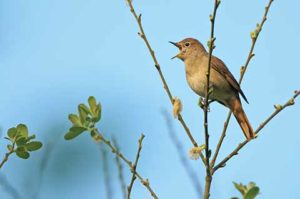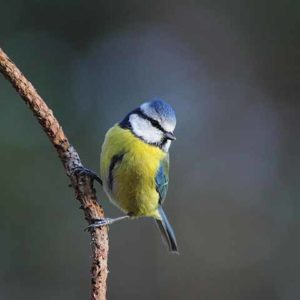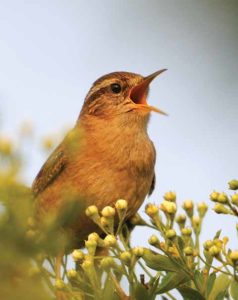Nature’s concert
Sally Welbourn invites us to open our ears to nature’s wonder: the dawn chorus
Published in May ’18
It is the time of year to enjoy nature’s tweets – and we don’t mean the electronic kind! At 5 am, when spring is in full swing, the skies are filled with the melodic, joyful sounds of birdsong. It is the welcome sound of the dawn chorus, and a sure sign that summer is on its way. Birdsong reaches its crescendo in late spring and early summer because birds are getting on with the essential business of breeding, with important tasks including establishing territory and trying to attract a mate. By the first week of May, when all the migrants have arrived, the sound of birdsong is unmissable, which is not only uplifting for us to hear, but perhaps also for the birds themselves. Many people believe they sing because they enjoy it. What a wonderful thought!
This year the International Dawn Chorus Day falls on 7 May. International Dawn Chorus Day began in 1984 with an event organised by the Wildlife Trust for Birmingham and the Black Country and is now established across Britain and further afield. Dorset Wildlife Trust is hoping that even those who don’t usually set their alarm for an early start might be able to make an exception to witness the sounds of nature reaching its peak at this time of year, with events organised at its Kingcombe Meadows Nature Reserve to mark
the occasion.
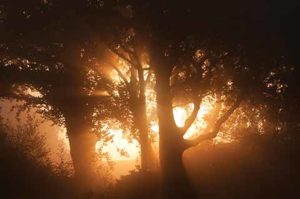
Getting out early, before the sun has crested the horizon, is the best way to hear the dawn chorus in full effect. Credit: Ross Hoddinott @ 2020vision
So why do we hear birds singing in the morning? Birds are out finding food later in the day when it is lighter, so just after they have woken up, they are using their time wisely, to keep their territory established, to make others aware of their presence and to build bonds with potential mates. The males want to attract a mate, and what better way to prove your worth than being the loudest and most talented singer! Often, the birds with enough energy to sing when it is cold and dark, are the birds who are best-fed, and they want the females to know that they have access to plentiful food stocks. To be effective, the song must be far-reaching and maintained over the longest period of time possible.
Witnessing the dawn chorus is a great way for bird enthusiasts to improve their bird ID skills, as the principal method for learning is to listen and practise. To hear birds singing individually, it is best to get out earlier, before the chorus reaches its crescendo. Many familiar garden birds take part in the dawn chorus, including blue tits and great tits, blackbirds, wrens, chaffinches, dunnocks, robins, blackcaps and goldfinches – to name just a few. The dawn chorus will reach its peak once the summer migrants are settled in and are setting up their nests.
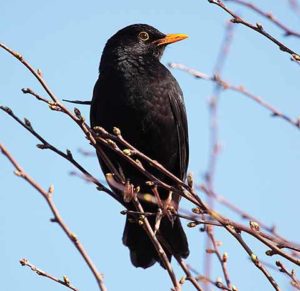
Turdus Merula – AKA the blackbird – is a member of the thrush and chat family and is an avid singer at dawn and at other times. Credit: Amy Lewis
One bird which is associated with singing, and would steal the show during a dawn chorus, is the nightingale. The sight of a nightingale may not match its bright and confident sound as they are small, brown and rather plain in appearance, but unmistakable from their fast succession of high, low and rich notes that few other species can match. However, nightingales are not all that common, so when listening to the dawn chorus, you might prefer to listen out for a blackcap, who also has a very melodic, fluting song, which is arguably one of the best. Blackcaps are also adept at mimicking other bird song, such as the nightingale, so if you can get a fleeting sight of your feathered friend, all the better to make sure your identification is accurate. One bird whose song is far bigger than its size is the tiny wren, which has a powerful warbling sound, often ending in a trill. Another bird which is easy to identify in the dawn chorus is the robin, voted the UK’s favourite bird. Like the wren, it is quite small and can sing far louder than you might imagine. Listen out for them also at night, where they can be heard singing in urban areas, next to street lights as well as in our gardens during the day.
Like any orchestra, the dawn chorus is organised into a sequence of sound. If you are out early, you will hear the robins, blackbirds and thrushes first. They have bigger eyes, so can be out and about in the dark and still catch the worms! Smaller birds with smaller eyes such as the woodpigeons, wrens, blue tits and warblers will come out later, when it is lighter and visibility is better.
Experienced bird watchers and listeners will be used to setting their alarms for the early hours, as throughout spring and summer the birds are generally far more active in the morning – after all, the early bird catches the worm! Another advantage of singing at dawn is because the light is still dim as the sun rises, reducing the likelihood of attracting predators from above. A bird sitting at the top of a tree in broad daylight would be a clear target for raptors.
The dawn chorus is arguably one of the best wildlife experiences of the year. It is soothing and exciting, and vibrant and uplifting. It might be a little too early for some, but 4 am, just before it gets light, is the best time to find a good place to sit and listen. Woodlands are the best locations as they have a high concentration of bird species in one place with lots of nest sites and territories in one area, but birds also like watery habitat, such as wetlands. For those who already have to get up early enough for work or school, there is a good chance you will hear a birdsong extravaganza as you fill your bird feeder or have your breakfast in the garden.
This spring, set your alarm, wrap up warm, take a flask and a camera with you, and wait. One by one, the birds’ songs will build into nature’s greatest concert. The best places to go in Dorset are DWT’s nature reserves, particularly Kilwood, Powerstock Common, Lorton Meadows and Kingcombe Meadows Nature Reserve.
www.dorsetwildlifetrust.org.uk/reserves. If you don’t have the time to get out and about and your garden has shrubs and trees, just throw open the window first thing and wait to be serenaded!
Head out with an expert from DWT at Kingcombe Meadows and return to the centre for a hearty breakfast at our Morning Chorus Breakfast on Friday 4th May from 5.30 – 8.30am. Book at www.kingcombe.org.
